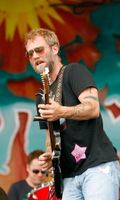New Orleans Music: The Sound of Survival

It’s impossible to hear the words “New Orleans” and not think of booming horns and stomping beats. The city has single-handedly incubated a staggering oeuvre of jazz, funk, blues, bounce, and hip hop. New Orleans is music, and music is New Orleans. It’s a fearlessly sensual enigma of sweat and lust and rhythm. A provocative hothouse where bands play their hearts out until the sun bursts on the horizon. I spoke with several New Orleans musicians about life before and after “the storm,” and learned that camaraderie and creativity can emanate from great strife.
“I still think about the storm every day,” said jazz musician Jeremy Davenport. “I packed up my stuff for what I thought was going to be three days. I literally had three changes of clothes. And I ended up being gone for nine months.” Originally from St. Louis, Jeremy moved to New Orleans in the late 80’s at the age of 18. He worked tirelessly and was determined to break into the scene. After training with Wynton and Ellis Marsalis he was introduced to Harry Connick Jr., with whom he played trumpet for six years. Since then he has released several solo albums and currently performs three nights a week at The Davenport Lounge in the Ritz-Carlton New Orleans. “I was so happy to come home,” he said.
Several New Orleans musicians never came back, including many from the city’s noted Ninth Ward area. Harry Connick, Jr. and Branford Marsalis founded Musicians’ Village near the Ninth Ward to provide subsidized housing for musicians who lost their homes, and organizations including Sweet Home New Orleans have provided musicians with financial assistance and helped them book gigs.
Saxophone player Mike Jenner moved to New Orleans from his hometown of Pittsburgh 12 years ago. He left for two years after the storm, spending time in Hoboken and Nashville. During that time he couldn’t sleep through the night and was increasingly antsy to return to New Orleans. “Before the storm it was really easy for musicians to make a full-time living playing music,” Mike said. “Now rents have doubled which has made things more difficult. It would be nice if gig pay increased with the cost of living, but it’s stayed the same.” Mike plays with eclectic funk rock band Johnny Sketch And The Dirty Notes, who has routinely been voted among the city’s best local rock bands. The band’s song “New Dixieland” is about Katrina. He also teaches jazz studies to high school students at New Orleans Center For Creative Arts. “There’s an unspoken bond that a lot of people have now because of the storm,” he said.
A lot of songs written since the storm were inspired by it and have served as therapy for many New Orleans residents. Some musicians, like the legendary Dr. John, have dedicated whole albums to the Katrina experience. Swedish singer-songwriter Anders Osborn penned the blues number “Oh Katrina” as a tribute to the hardship residents were forced to endure. Singer-songwriter Alex McMurray has dedicated himself to performing honest and heartfelt songs about what it really means to live in New Orleans. The aftermath of Katrina also helped influence a relatively new and somewhat avant-garde experimental music scene that’s quietly taking shape. Efforts like the Open Ears music series encourage musicians to compose original music with nontraditional arrangements. “Musicians go to Open Ears to improvise and play stuff they don’t normally play,” Mike said. “It’s cool to show up and listen to what other people are creating other than the stuff they play every day.”
More than anything, New Orleans musicians want to keep playing and hope that music fans from across the world will continue to visit the city and support the magic of live music. “People should come down here and not be scared,” Mike said. “It’s so inspiring here right now. My friends and colleagues are performing some of the best music I’ve ever heard.”


